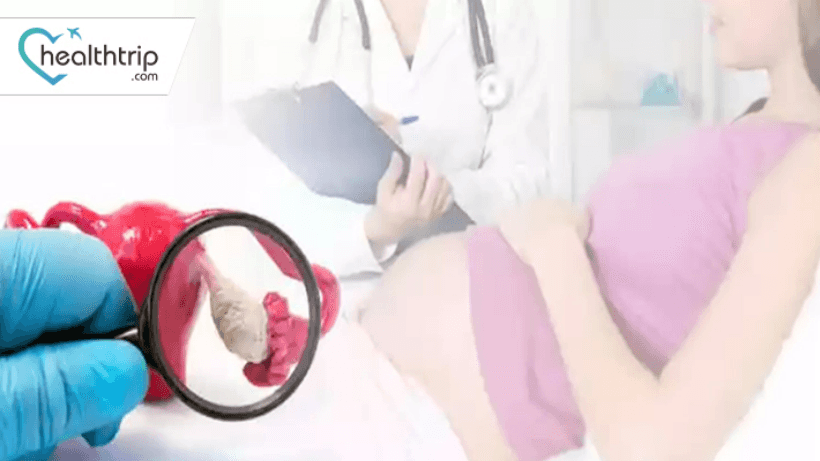
Follicular Study Test
10 Sep, 2023
 Healthtrip Team
Healthtrip TeamReproductive health is a treasure that we often take for granted, yet it plays a pivotal role in shaping the course of our lives. Our ability to conceive and bring new life into the world is nothing short of miraculous. However, when the road to parenthood becomes a winding and challenging journey, it's essential to have the right tools at our disposal. One such tool is the follicular study test, a beacon of hope in the realm of fertility assessment and treatment. In this blog, we'll delve into the world of follicular study tests, demystifying their significance, the different types available, and the reasons why they are conducted. So, let's embark on this enlightening journey towards understanding our bodies and reproductive health better.
What Is the Follicular Study Test?
Let's start with the basics. The follicular study test is like a detective's magnifying glass, allowing doctors to closely examine the ovaries and the tiny, essential structures within called ovarian follicles. These follicles are the precursors to eggs and play a pivotal role in a woman's fertility journey.
Most popular procedures in India
Imagine your ovaries as bustling marketplaces, where these tiny follicles are like stalls holding potential eggs. During each menstrual cycle, a group of follicles competes to become the star of the show, with one eventually becoming the dominant follicle and releasing an egg during ovulation. This process is essential for natural conception.
The follicular study test's main role is to track these ovarian follicles throughout the menstrual cycle, helping doctors monitor their growth and development. This close observation provides crucial insights into a woman's reproductive health, particularly her ovulatory function and the quality of her eggs. It's like having a backstage pass to the intricate dance of fertility.
Wellness Treatments
Give yourself the time to relax
Lowest Prices Guaranteed!

Lowest Prices Guaranteed!
Types of Follicular Study Tests
The follicular study test is a valuable tool in assessing reproductive health and fertility. There are different types of follicular study tests, each serving specific purposes and providing unique insights into a person's reproductive system. Here are the main types:
- Transvaginal Ultrasound (TVUS):
- TVUS is one of the most common and non-invasive methods used in follicular studies. It involves inserting a thin, wand-like ultrasound probe into the vagina to visualize the ovaries and their follicles.
- Purpose: TVUS allows for a detailed examination of the size, number, and growth of ovarian follicles. It provides information about the development of follicles throughout the menstrual cycle.
- Pelvic Ultrasound:
- A pelvic ultrasound is an external ultrasound that uses a transducer placed on the abdomen to create images of the pelvic organs, including the ovaries.
- Purpose: While not as detailed as TVUS, a pelvic ultrasound can still provide useful information about the ovaries and uterine structures. It is sometimes used as an alternative when TVUS is not possible or necessary.
- Blood Hormone Tests:
- In addition to ultrasounds, blood tests are often used in follicular studies to measure hormone levels.
- Purpose: Hormone tests, such as measuring follicle-stimulating hormone (FSH), luteinizing hormone (LH), and estradiol (E2), provide insights into the hormonal changes that accompany follicle development. Abnormal hormone levels can indicate issues with ovulation and fertility.
- Intrauterine Insemination (IUI) Monitoring:
- IUI is an assisted reproductive technique where sperm is placed directly into the uterus. Follicular monitoring is crucial in IUI cycles to time the insemination accurately.
- Purpose: Follicular tracking ensures that the IUI procedure aligns with ovulation, optimizing the chances of successful fertilization.
- In Vitro Fertilization (IVF) Cycle Monitoring:
- IVF is a more complex fertility treatment that involves retrieving eggs, fertilizing them in a laboratory, and transferring embryos into the uterus. Follicular monitoring is an integral part of IVF.
- Purpose: It helps IVF specialists determine the optimal time for egg retrieval, monitor the growth of follicles stimulated by fertility medications, and assess the readiness of the uterine lining for embryo transfer.
- Natural Cycle Monitoring:
- Natural cycle monitoring involves tracking the development of ovarian follicles in a woman's natural menstrual cycle, without the use of fertility medications.
- Purpose: This type of monitoring is often chosen by those seeking a more natural approach to fertility assessment and treatment. It provides insights into the natural ovulation process and helps time intercourse for conception.
- Clomiphene Citrate (Clomid) Cycle Monitoring:
- Clomiphene citrate is a medication commonly used to induce ovulation. Follicular study tests are used to monitor the response to Clomid treatment.
- Purpose: Monitoring ensures that the medication is stimulating follicle growth appropriately and helps predict the timing of ovulation.
The choice of follicular study test depends on individual circumstances, such as the reason for the assessment, the presence of underlying conditions, and the specific fertility treatment plan. Your healthcare provider will recommend the most suitable type or combination of tests to address your unique needs and goals in the journey toward better reproductive health.
For instance, transvaginal ultrasound is a common method used to visualize the ovaries and their follicles. It's like taking a sneak peek inside your reproductive system, all while being comfortable and non-invasive. On the other hand, blood tests can also be used in conjunction with ultrasound to measure hormone levels, adding another layer of insight into your fertility.
The choice of test and when it's used depends on your unique circumstances. Your doctor will recommend the most suitable one based on your specific needs and goals.
Why Is This Test Done?
But why, you might ask, would anyone need a follicular study test? Well, there are several compelling reasons.
Firstly, it's a powerful tool in assessing fertility issues. If you've been struggling to conceive, this test can shed light on potential obstacles, such as irregular ovulation or the presence of conditions like polycystic ovary syndrome (PCOS).
Additionally, the follicular study test is a valuable asset in the realm of assisted reproductive techniques. For those undergoing procedures like in vitro fertilization (IVF) or intrauterine insemination (IUI), understanding the development of ovarian follicles is vital for optimizing the chances of success.
In essence, the follicular study test is like a compass guiding those on the path to parenthood, helping them navigate the complexities of fertility and reproductive health. In the following sections, we'll delve deeper into the procedure, benefits, and tips for preparing for this test. So, stay tuned as we unravel the mysteries of this remarkable tool.
Procedure of Follicular Study Tests
Now that we understand why the follicular study test is important, let's dive into the nitty-gritty details of what happens when you undergo this examination.
a. What Does It Diagnose?
The follicular study test is like a medical detective, equipped to uncover a range of reproductive health issues. It can diagnose conditions and problems such as:
- Irregular Ovulation: If you're struggling with irregular menstrual cycles or skipped periods, the test can identify irregularities in your ovulation pattern.
- Polycystic Ovary Syndrome (PCOS): PCOS is a common hormonal disorder that can lead to fertility challenges. The follicular study can help in diagnosing PCOS by revealing the presence of numerous small cysts on the ovaries.
- Assisted Reproduction Planning: For those undergoing assisted reproductive techniques like IVF or IUI, the test plays a pivotal role in planning and optimizing treatment by tracking follicular development.
- Unexplained Infertility: Sometimes, couples face the frustrating diagnosis of unexplained infertility. The follicular study can provide valuable insights into possible contributing factors.
b. How the Test Is Performed / How It Works
- Step-by-Step Procedure: The follicular study typically involves a series of ultrasounds and sometimes blood tests throughout your menstrual cycle. It begins with an initial baseline ultrasound at the start of your cycle to assess the resting follicles.
- Ultrasound and Blood Tests: During the test, a transvaginal ultrasound probe is gently inserted into the vagina to visualize the ovaries and follicles. This non-invasive procedure provides high-quality images. Additionally, blood tests may be done to measure hormone levels, especially the follicle-stimulating hormone (FSH) and luteinizing hormone (LH).
- Timing Matters: Timing is critical during the follicular study. Monitoring typically starts on the second or third day of your menstrual cycle, as this is when the baseline ultrasound is performed. Subsequent ultrasounds are scheduled based on your individual response to the medications or natural cycle.
c. What Happens Before the Test?
Before you undergo a follicular study, here are some key preparations to keep in mind:
- Menstrual Cycle Tracking: If you have regular menstrual cycles, track your cycle start date. If your cycles are irregular, consult your doctor for guidance.
- Medication Review: Inform your healthcare provider about any medications, including birth control, supplements, or fertility medications, that you may be taking.
- Diet and Lifestyle: Maintain a balanced diet and healthy lifestyle. Your doctor may recommend dietary changes or specific lifestyle modifications depending on your situation.
d. What Happens During the Test?
During the follicular study:
- Ultrasound Procedure: You'll be asked to lie on an examination table. A lubricated transvaginal ultrasound probe will be gently inserted into your vagina. It might feel a little uncomfortable, but it's typically not painful.
- Blood Tests: If your doctor orders blood tests, a healthcare professional will draw a small amount of blood from your arm. This process is quick and relatively painless.
- Role of the Healthcare Team: The ultrasound and blood tests will be conducted by a trained healthcare team, including a sonographer and a phlebotomist. They'll ensure your comfort throughout the procedure.
e. What Happens After the Test?
After the follicular study:
- Your doctor will discuss the results with you. If any concerns or issues are identified, they will explain what they mean and discuss possible treatment options.
- Follow-Up Appointments: Depending on the results and your treatment plan, you may need to schedule follow-up appointments to monitor your progress or adjust your treatment.
f. How Long Does a Test Take?
The duration of a follicular study test can vary:
- Baseline Ultrasound: The initial baseline ultrasound typically takes around 15-20 minutes.
- Subsequent Ultrasounds: Follow-up ultrasounds are usually quicker, taking about 10-15 minutes.
- Blood Tests: Blood tests are relatively fast, with the actual collection taking only a few minutes.
Keep in mind that individual circumstances, such as the complexity of your case or any specific treatment protocols, can affect the overall time required for the test. Your healthcare provider will give you a more precise estimate based on your situation.
How the Test Will Feel
The follicular study test, understandably, may raise some questions about how it feels. Let's walk through what you can expect:
- Sensations: During the transvaginal ultrasound, you may experience a sensation of pressure or fullness in your pelvic region as the probe is gently inserted. While it might feel slightly uncomfortable, it's generally not painful.
- Potential Discomfort or Pain: It's important to note that any discomfort or mild cramping you might feel during the test is typically temporary and minimal. Most women find it manageable and well worth the valuable insights gained.
- Temporary Nature: Any discomfort you might experience usually lasts only for the duration of the procedure, which is relatively short. Rest assured that the healthcare team will prioritize your comfort and minimize any discomfort you might feel.
How to Prepare for the Test: Things to Keep in Mind
Preparing for a follicular study test involves some straightforward steps to ensure accurate results and a smooth experience. Here's a checklist of preparations:
- Cycle Tracking: Keep a record of menstrual cycle dates.
- Medication Review: Share all medications and supplements with your provider.
- Dietary Considerations: Maintain a balanced diet for reproductive health.
- Hydration: Stay well-hydrated for clear ultrasound imaging.
- Lifestyle Adjustments: Reduce smoking, manage stress.
- Comfortable Clothing: Wear comfy attire for the test.
- Arrival Time: Be punctual for scheduled appointments.
- Support Person: Bring someone for emotional support if needed.
- Ask Questions: Don't hesitate to communicate concerns.
- Anxiety Reduction: Practice relaxation techniques for calmness.
Your healthcare team is experienced in conducting follicular study tests, and they will prioritize your comfort and well-being throughout the process.
Interpreting the Results: What Do the Numbers Mean?
Understanding the numbers and measurements in your follicular study results is crucial to grasp what's happening with your fertility. Here's a breakdown of what those numbers signify:
- Follicle Size: The size of the ovarian follicles is a key indicator. As your menstrual cycle progresses, follicles should grow. A follicle that's too small or too large may indicate a problem.
- Hormone Levels: Blood tests measure hormone levels, including follicle-stimulating hormone (FSH) and luteinizing hormone (LH). Elevated FSH levels may suggest diminished ovarian reserve, while abnormal LH levels can indicate irregular ovulation.
- Endometrial Thickness: The thickness of your uterine lining (endometrium) is also monitored. It should grow adequately during your cycle to support embryo implantation.
- Number of Follicles: The presence and number of follicles are essential. Too few or too many follicles can provide insights into conditions like PCOS or the response to fertility medications.
- Timing of Ovulation: By tracking the follicular development, your doctor can predict the timing of ovulation, enabling you to plan intercourse or fertility treatments effectively.
- Normal Ranges: Normal ranges vary depending on your age, medical history, and specific circumstances. Your doctor will interpret your results in the context of your unique situation.
- Deviations: Deviations from expected measurements or hormone levels may indicate fertility challenges or underlying conditions that need further evaluation and treatment.
It's important to remember that while these numbers provide valuable information, they are just one piece of the puzzle. Your healthcare provider will consider your complete medical history and clinical presentation to provide a comprehensive interpretation of your results. If you have any questions or concerns about your results, don't hesitate to discuss them with your doctor. Understanding these numbers empowers you to make informed decisions about your fertility journey.
Advantages of Follicular Study Tests
- Early detection of fertility issues
- Tailored treatment plans
- Enhanced chances of successful conception
- Monitoring of assisted reproductive techniques
- Informed decision-making
Risks of Follicular Study Tests
- Minimal discomfort during the test
- Potential for rare complications (e.g., infection)
- Emotional stress associated with fertility assessment
Applications of Follicular Study Tests
- Diagnosis of irregular ovulation
- Assessment of polycystic ovary syndrome (PCOS)
- Planning and optimizing assisted reproductive techniques (IVF, IUI)
- Tracking follicular development in fertility treatments
- Identification of unexplained infertility causes
In closing, the follicular study test is not merely a medical examination; it's a symbol of hope and a tool for empowerment. It allows us to take control of our reproductive health, unravel the mysteries of fertility, and ultimately, embark on the incredible journey of parenthood with confidence. So, as you consider your own path, remember that you have the knowledge and the tools to navigate it.
Related Blogs

Bourn Hall: Pioneers in Fertility Care and Beyond
Learn about Bourn Hall's groundbreaking approach to fertility care and

Revolutionizing Fertility Treatment: A New Era at Bourn Hall
Discover how Bourn Hall is changing the game in fertility

Journey to Parenthood with NU Fertility Bangalore
NU Fertility Bangalore offers a comprehensive range of fertility treatments

Conquering Infertility with Advanced Care in Bangalore
Get expert fertility treatment in Bangalore with NU Fertility, a

Discover the Path to Parenthood with IERA Lisbon
Experience world-class fertility care at IERA Lisbon, a leading Assisted

Unravel the Mysteries of Fertility with IERA Lisbon Experts
Get personalized fertility guidance from IERA Lisbon's renowned experts










